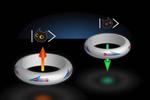Other

“A robot has performed laparoscopic surgery on the soft tissue of a pig without the guiding hand of a human—a significant step toward fully automated surgery on humans. Designed by a team of Johns Hopkins University researchers, the Smart …

“A team led by students probes the mass-radius relation of white dwarf stars, observing in their data evidence of quantum mechanics and Einstein’s theory of general relativity At the heart of every white dwarf star—the dense stellar object …

“Johns Hopkins mechanical engineers design a snake robot based on the climbing technique of the kingsnake that could help advance search-and-rescue technology Snakes live in diverse environments ranging from unbearably hot deserts to lush tropical forests. But regardless of their …

“The material naturally exists between two states, a finding that could pave the way for more complex computing in the future Quantum computers with the ability to perform complex calculations, encrypt data more securely, and more quickly predict the spread …

“A new material that is as stiff as metal but flexible enough to withstand strong vibrations could transform the car manufacturing industry, say experts from the University of Surrey. In a paper published in Scientific Reports, scientists from Surrey joined …

“Amputees often experience the sensation of a “phantom limb”—a feeling that a missing body part is still there. That sensory illusion is closer to becoming a reality thanks to a team of engineers at the Johns Hopkins University that …

“The New Horizons spacecraft experienced an anomaly this afternoon that led to a loss of communication with Earth. Communication has since been reestablished and the spacecraft is healthy. The mission operations center at the Johns Hopkins University Applied Physics Laboratory …

“Researchers have invented a non-invasive way for thousands of nanometer-sized robots to perform tissue biopsies. Developed by Professor David Gracias at Johns Hopkins University, these starfish-shaped robots are able to enter the body, collect a minuscule tissue sample, then be …

